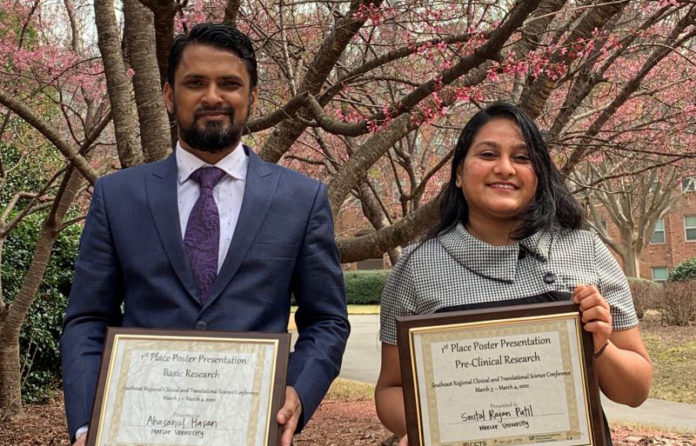
Two Mercer University College of Pharmacy students pursuing their Ph.D. degrees in pharmaceutical sciences have been recognized for their research.
Ahasanul Hasan and Smital Patil won first place in the basic research and pre-clinical research categories, respectively, at the Southeast Regional Clinical and Translational Science Alliance annual conference, held March 3-4 at Callaway Resort & Gardens in Pine Mountain.
Hasan, a third-year Ph.D. student in the cardiovascular research laboratory of Dr. Raquibul Hasan, examined the mechanism by which a drug used to treat Type II diabetes also lowers blood pressure.
Patil, a third-year Ph.D. student in the vaccine nanotechnology laboratory of Dr. Martin D’Souza, researched the effectiveness of using microneedles to deliver vaccines for COVID-19 and respiratory syncytial virus, commonly known as RSV.
“We are very excited for Ahasanul and Smital, whose awards reflect not only the quality of their presentations but also the caliber of the science that they are conducting,” said Dr. Nader Moniri, professor and associate dean for research in the College of Pharmacy. “To have Mercer students win first place in both the basic science and pre-clinical categories exemplifies the quality and translational impact of the research our faculty and students are doing.”
Examining how one drug may work to reduce hypertension
At the conference, Ahasanul Hasan presented his original research on canagliflozin, a drug used to treat Type II diabetes.
Canagliflozin belongs to a class of drugs known as sodium-glucose cotransporter-2 (SGLT-2) inhibitors. These drugs work by blocking the SGLT-2 that facilitates glucose reabsorption in the kidneys, resulting in increased glucose excretion in urine. This in turn results in lower blood sugar levels.
Clinical trials on canagliflozin showed that in addition to lowering blood sugar, it also lowered blood pressure. This action is beneficial because many people who have diabetes also have hypertension.
“As the presence of diabetes and high blood pressure put patients at much higher risk of heart attack, stroke and sudden death, such blood pressure lowering action of canagliflozin may greatly benefit these patients,” Ahasanul Hasan said.
However, the mechanism by which canagliflozin lowers blood pressure is unclear. The conventional thinking was that canagliflozin removes excessive glucose from the body, which removes extra fluid as well. As a result, blood volume decreases, which lowers blood pressure.
Blood pressure is also regulated by small blood vessels in the body. In his research, Ahasanul Hasan tested if canagliflozin could directly relax small blood vessels to lower blood pressure regardless of blood glucose.
He found that canagliflozin directly relaxes small blood vessels regardless of its action on SGLT-2 and glucose level. It does so by stimulating several voltage-gated potassium channels Kv1.5, Kv2.1 and Kv7 in arterial smooth muscle cells. Relaxation of small blood vessels reduces vascular resistance and blood pressure.
“And this is another mechanism by which canagliflozin in the diabetic patients could reduce blood pressure in addition to the conventional concept of volume reduction,” Ahasanul Hasan said.
As part of his Ph.D. thesis, he also is researching two other drugs belonging to the same class.
This research project is part of a larger initiative in Dr. Raquibul Hasan’s laboratory that aims to discover new drugs and repurpose existing drugs to find better remedies for high blood pressure, diabetes, heart disease, erectile dysfunction and stroke.
After graduation, Ahasanul Hasan plans to return to his job as an assistant professor in the Department of Clinical Pharmacy and Pharmacology at the University of Dhaka in Bangladesh, where he has taught since 2011.
Researching the use of microneedles for COVID-19, RSV vaccines
At the conference, Patil presented posters on the use of microneedles to deliver vaccines for COVID-19 and RSV.
Currently approved COVID-19 vaccines require cold chain storage, which can make transporting them a challenge as they require cold temperatures throughout the supply chain process. In addition, they are administered by a shot into the muscle, which can be painful to the patient.
Patil’s research looked to solve those problems by creating a more stable, painless vaccine using microneedles.
She did this by creating a vaccine using the spike protein of the virus and encapsulating it in a microparticle, which would eliminate the need for cold chain storage and thus make it more accessible to developing countries.
The microparticles were then used to formulate quick-dissolving microneedles, which could be administered using a Band-Aid-like patch. Patients could administer the patches themselves, reducing pain associated with vaccine delivery and increasing compliance, Patil said.
She also presented work on a similar delivery system for an RSV vaccine.
RSV is a common virus that generally causes mild, cold-like symptoms but can cause severe infection in infants and older adults. No vaccine is currently available for the virus, and past vaccine trials using the inactivated virus failed, Patil said.
“Now what we are using are fusion protein as virus-like particles, which are non-infectious,” she said. “So, it’s not actually the protein from the virus; it is a virus-like protein.”
The fusion protein was encapsulated into microparticles, which were loaded onto microneedles for pain-free immunization, she said.
“These microneedles are minimally invasive, and we observed that we were able to see a robust immune response,” she said.
This research project is part of a larger initiative in Dr. D’Souza’s laboratory that aims to discover new vaccines for cancers, such as ovarian, breast, melanoma and prostate, and infectious diseases, such as COVID-19, RSV, influenza and Zika.
After graduation, Patil plans to work in the pharmaceutical industry, helping with the development of vaccines.
The conference, hosted by the Georgia Clinical and Translational Science Alliance, brought together researchers from across the region to present the best new health-related preclinical, clinical, implementation and population-based research.
In addition to Mercer, other participants included Emory University, Florida State University, the University of Florida, Georgia Tech, the University of Alabama at Birmingham and the University of Georgia.









